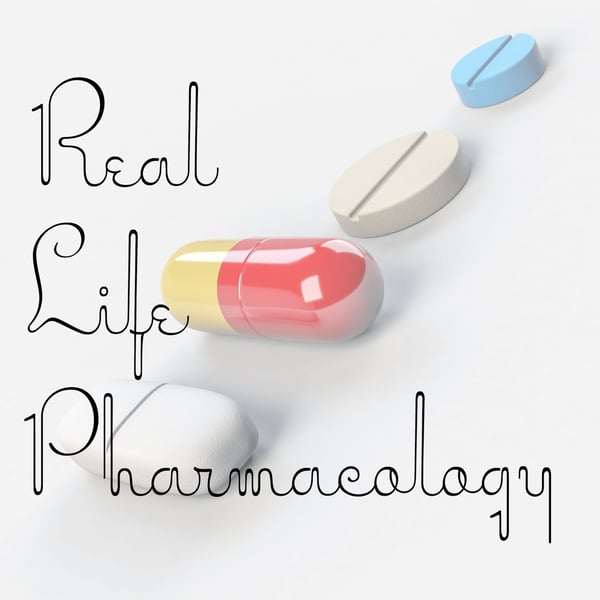Tacrolimus Pharmacology
Real Life Pharmacology - Pharmacology Education for Health Care Professionals
Eric Christianson, PharmD; Pharmacology Expert and Clinical Pharmacist
5 • 716 Ratings
🗓️ 4 February 2021
⏱️ 15 minutes
🧾️ Download transcript
Summary
Tacrolimus has a long list of potential adverse effects such as hyperglycemia, renal impairment, GI toxicity, and hypertriglyceridemia.
Important monitoring parameters for tacrolimus include drug levels, electrolytes, renal function, and blood sugars.
CYP3A4 interactions are critical with tacrolimus. Inhibitors can raise concentrations and inducers can lower concentrations.
Transcript
Click on a timestamp to play from that location
| 0:00.0 | Hey all, welcome back to the Real Life Pharmacology podcast. I'm your host pharmacist, Eric Christensen, |
| 0:05.9 | and I thank you so much for listening today. As always, go check out real-life pharmacology.com. |
| 0:12.7 | Get your free 31-page PDF, top 200 study guide, great little review. For those of you who are practicing in clinical practice |
| 0:23.5 | as well as those of you that may be taking board exams or pharmacology exams. So definitely |
| 0:29.1 | go snag that for free. We get you updates as to when we've got new podcasts out or potentially |
| 0:35.5 | other new content too. So with that, let's get into the drug of the day |
| 0:40.5 | today and that is tachrolomus. I have heard it pronounced tachrolomus as well. I prefer it to |
| 0:47.4 | chrylamus. The brand name of this medication that I hear most often in clinical practice is Prograph. |
| 0:57.2 | And this medication is an immunosuppressive agent. So we're going to suppress the immune system. |
| 1:06.3 | So why would we want to do something like that? Well, of course, in organ transplantation, |
| 1:14.6 | we don't want our own immune system to potentially attack that transplanted organ. So we |
| 1:22.1 | suppress the immune system to try to prevent that from happening. |
| 1:28.5 | As far as the classification goes and the mechanism of action, |
| 1:33.7 | Tachrolomus is a calcane inhibitor. |
| 1:37.3 | Ultimately, this inhibits the activation of T lymphocytes. |
| 1:42.7 | And if you remember, T lymphocytes play an important role of adaptive lymphocytes. And if you remember, T lymphocytes play an important role of |
| 1:46.6 | adaptive immunity in recognizing new antigens, basically foreign substances that are in the body |
| 1:56.6 | and sets up the immune system to help attack that and get rid of that, which under normal |
| 2:03.7 | circumstances of infection or, you know, cancerous or malignant cells, that's an appropriate |
| 2:12.9 | thing and something that we absolutely want and need to survive. However, in transplantation, |
| 2:22.4 | we do not want that immune system, obviously attacking the organ that we're trying to transplant |
| 2:30.3 | there. So as you can imagine, there's definitely some challenges with organ transplantation |
... |
Please login to see the full transcript.
Disclaimer: The podcast and artwork embedded on this page are from Eric Christianson, PharmD; Pharmacology Expert and Clinical Pharmacist, and are the property of its owner and not affiliated with or endorsed by Tapesearch.
Generated transcripts are the property of Eric Christianson, PharmD; Pharmacology Expert and Clinical Pharmacist and are distributed freely under the Fair Use doctrine. Transcripts generated by Tapesearch are not guaranteed to be accurate.
Copyright © Tapesearch 2025.

